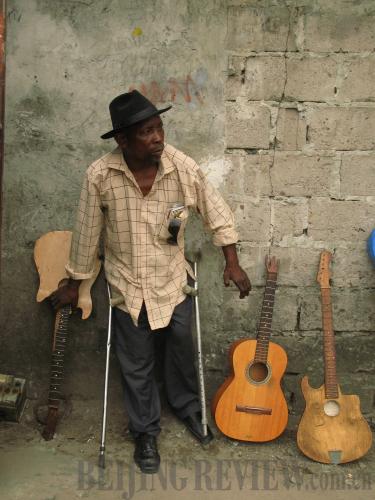|
 |
|
Ricky Likabu, the band leader (FLORENT DE LA TULLAYE) |
Some people use music to relax, others to dance. For the band Staff Benda Bilili, music is about passing on a message. It's even embedded in their name. Benda Bilili in essence means "look beyond appearances" in Lingala, the lingua franca of Kinshasa in the Democratic Republic of the Congo, where the group of street musicians hails from. Considering that most of Staff Benda Bilili's members are paraplegics (and formerly homeless), the message is particularly apt.
Nowadays, the band enjoys major success. Their debut album Très Très Fort, an electrifying 11-track mix of rhythm and blues, reggae, soul and rumba, was released in 2009. It garnered the group a WOMEX (World Music Expo) Artist Award that year. Afropop Worldwide, the international database dedicated to increasing the profile of African musicians, named Très Très Fort among their top 10 albums. Staff Benda Bilili is currently in the middle of their second worldwide tour (their first was a European tour) and will be playing in Japan this month.
It's a long way from what came before. "They were struggling to survive," says Renaud Barret, a French filmmaker who has known the band since 2004. He and his filmmaking partner Florent de La Tullaye spent five years with Staff Benda Bilili, documenting their struggles and helping to produce Très Très Fort. This past May, their film about the entire saga, Benda Bilili!, opened the Directors' Fortnight at the Cannes Film Festival.
The band
"We met the Benda Bilili quite by chance as they were playing-begging at night in front of a restaurant for fat, overpaid UN expatriates. We immediately fell in love with their music and strong personalities," explains Barret in an interview with ChinAfrica. Five of the band's members, Ricky Likabu, Theo Nsituvuidi, Kabose Kabamba, Djunana Tangagrew and Coco Ngambali, grew up battling polio, which typically ravages its victims, leaving them physically handicapped. Watching Staff Benda Bilili on stage, the decked-out tricycles used by the musicians to get around are presences unto themselves.
At 60 years old, Likabu is "the wise [one]" of the group according to Barret, and heads the band. "When he first met us six years ago, he instantly had a positive vision, whereas the other members saw us [Barret and de La Tullaye] as crooks trying to steal their music away. He convinced them, and has managed to keep the band united all these years." Endowed with a strong sense of discipline and hierarchy, Likabu is "a father figure to all the people from the street. He's the natural leader," says Barret.
The man who composes most of Staff Benda Bilili's songs is 55-year-old Ngambali, whose guitar playing and singing "are the basis of the [band's] musical alchemy and poetry." Barret is quick to add that the songwriter is "a wonderful, generous and humble person – a great artist."
Staff Benda Bilili's surprise element, though, is Roger Landu, a street kid (shege in Kinshasa parlance) who Likabu came across begging for money when the boy was 12 years old. Landu was playing an instrument he had fashioned on his own. Referred to as a satonge, it consists of a string tightened between the drum of a tin can and a wooden bow inserted at its base. Just like the stringed erhu used by many Chinese street musicians, Landu's single stringed guitar was not simple to play. And yet, he performed with ease.
"Roger had what musicians call 'the perfect hear'," explains Barret. Realizing Landu's potential, Likabu decided to adopt him and bring him into the band. Now 19 years old, Landu's playing has been repeatedly compared by various music critics in the international press to that of a certain guitar legend. Even Barret invokes the name: "Roger is a stage phenomenon... like an African Jimi Hendrix."
|